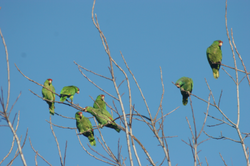 Revvell Revati shared this picture of parrots in her trees earlier this week.
Revvell Revati shared this picture of parrots in her trees earlier this week.
Get ready for a cold, wet weekend, says the National Weather Service:
Friday night, rain is predicted and snow showers are likely. Heavy rain, thunder, 90% chance of precipitation, and snow showers around 1500-1000 feet. High is near 56 on Friday, and predicted low is 42 degrees.
Saturday, high near 42 degrees.60% preciptation, and new snow accumulation of less than an inch in the hills possible.
Sunday it's to be mostly sunny, with high hear 52 and low around 36 degrees.
So where do the parrots come in?
Lori Paul shares the following:
Freezing temperatures may make local hikes fun, but a bit more hazardous... Prepare accordingly with extra warm dress, sturdy hiking boots, and appropriate emergency supplies. Let friends or family know where you are going and when you expect to return.
For those who have frost-vulnerable tropical plants and fruit trees, see some tips copied below for protecting those plants around your home. When in doubt, type your plant into Google along with the phrase, "temperature hardiness," and you should be able to determine if it needs special protection. Without special care, some garden plants will freeze and either die back or just die for good.
For those with horses, small livestock and outdoor pets... Plan now to provide them with sufficient shelter and warmth. For small animals, such as rabbits and guinea pigs, bring them temporarily inside a warm garage or house and provide them with abundant, clean bedding material.
Chickens can withstand cold temperatures, but require protection from rain, snow and cold wind. They will need extra warm straw, wood shavings or other bedding in their coop. Be sure that their water bowls do not freeze over. Chickens fluff up and huddle together for warmth. If you have just one or two hens, consider bringing the birds inside or provide an old incandescent bulb or heat emitter bulb (available from pet stores) in the coop for added warmth.
Local wild parrots (mostly Amazon parrots) and peacocks are tropical species that may not fare well in freezing temperatures and snow. If you find wild parrots or peacocks in distress (unconscious or grounded, confused and easy to approach due to extreme cold) wrap them in a towel or a large blanket (in the case of peafowl), place them in a kennel carrier or sturdy box with air holes, and bring them into a heated garage, barn, or other warm, sheltered area. As soon as possible, transport them to Pasadena Humane Society where they will receive care and later be released:
Pasadena Humane Society, 361 S Raymond Ave, Pasadena, CA 91105. 626.792.7151
Pasadena Humane Society accepts "wild animals" from Altadena. Feral parrots and peafowl are not "owned" by anyone; therefore, they are considered "wild" and will be taken in for care. A small thank you donation to the humane society for helping animals outside their service area is always appreciated.



